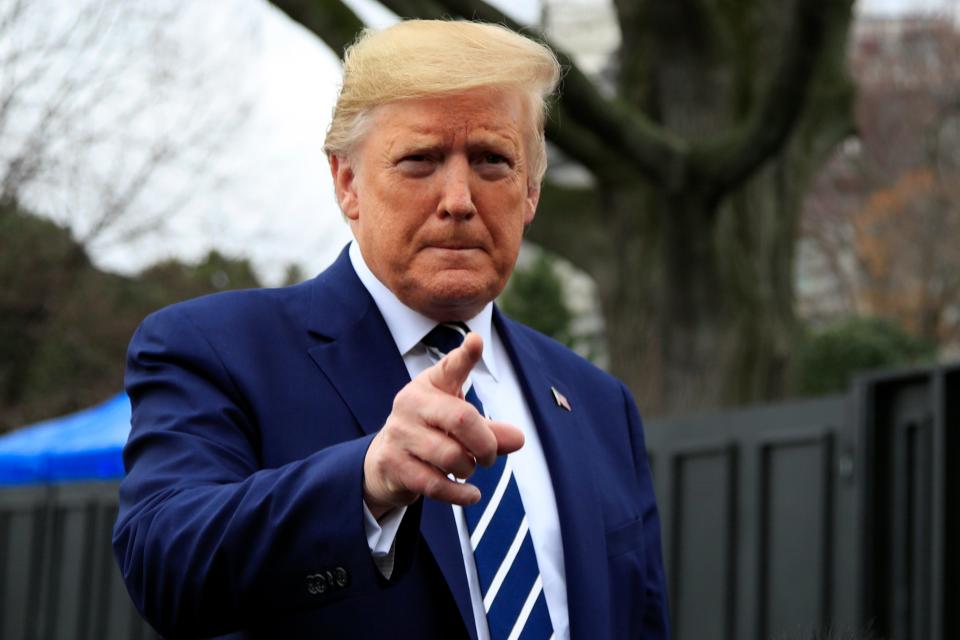Trump said he had 'very good talk' with Taliban leader amid criticism of Afghanistan peace deal
WASHINGTON – Trying to hold together a U.S.-Taliban peace deal, President Donald Trump said Tuesday he had a "very good talk" with the leader of that militant Islamic group, despite renewed threats of violence in Afghanistan.
"The relationship is very good that I have with the mullah," Trump told reporters Tuesday during a briefing on coronavirus at the National Institutes of Health. "We had a good, long conversation today, and you know, they want to cease the violence."
The Taliban disclosed Trump's phone call with its political leader, Mullah Abdul Ghani Barader, before the White House did.
A Taliban readout claimed Trump told the mullah that "it is a pleasure to talk to you. You are a tough people and have a great country and I understand that you are fighting for your homeland."
Trump bemoaned the "trillions of dollars" the U.S. has spent in Afghanistan and said American troops are just serving as a "police force" there.
The unusual conversation came three days after U.S. and Taliban negotiators signed a historic agreement that could end 19 years of war in Afghanistan and allow Trump to begin the promised withdrawal of American troops.
More: Historic peace deal in Afghanistan reached with Taliban, allowing withdrawal of US troops
The four-page pact spells out a timetable for the United States to withdraw its 13,000 troops from Afghanistan. In exchange, the Taliban agreed to sever its ties with al-Qaida, the terrorist group that launched the 9/11 attacks against the U.S.

But some of Trump's staunchest Republican allies have criticized the agreement, saying the pact is flawed and could jeopardize U.S. national security.
During a House hearing Tuesday, Rep. Liz Cheney, R-Wyo., said the Trump administration had made dangerous concessions to the Taliban – including a promise to secure the release of as many as 5,000 Taliban fighters and giving a timeline for the complete withdrawal of all U.S. forces from Afghanistan.
Cheney also suggested that Secretary of State Mike Pompeo had mislead lawmakers and the public about the agreement’s secret annexes. Pompeo and other Trump administration officials have said the classified provisions of the pact spell out verification and implementation measures, so the U.S. can determine if the Taliban is keeping its promises to renounce al-Qaida and sever its ties with that terrorist organization.
Super Tuesday latest: Coronavirus fears caused staffing issues at Super Tuesday polling sites in Texas
“(Pompeo) made assertions, including that there were complex, interlocking verification mechanisms,” Cheney said during a House Armed Services Committee hearing with two top Pentagon officials. “He asserted there would be a full and compete renunciation of al-Qaida by the Taliban."
“The documents that have been sent to the Hill do not include those things,” she said.“We have no verification agreement, and we have a number of secret documents” that should be made public, she said.
Cheney said Taliban leaders have seen the documents, so there's no reason they should remain classified.
“I believe the American people deserve to know what agreement has been entered into in our name with the terrorists who harbored those who killed 3,000 Americans on 9/11,” she said.
The State Department did not respond to a request for comment.
Trump’s phone call with the Taliban official also came amid renewed fighting in Afghanistan, despite a U.S.-brokered pact aimed at ending such attacks.
The Afghan government said the Taliban had carried out 33 terrorist attacks in the country, killing civilians and prompting a counter-attack from Afghan defense forces.
“In the past 24 hours, the Taliban have carried out 33 terrorist attacks on 16 civilians in the country's 16 provinces and the security and defense forces have unfortunately killed 6 civilians and wounded 14 others,” Nasrat Rahimi, a government spokesman, wrote in a Twitter post on Tuesday. “The Taliban must stop killing civilians, otherwise the security forces will act and suppress them in order to defend themselves and the people.”
Critics fear the deal could unravel if the Taliban and the U.S.-backed Afghan government are unable to agree on a power-sharing deal and a permanent ceasefire. The two sides are already disputing the terms of a U.S.-endorsed prisoner exchange.
This article originally appeared on USA TODAY: Trump said he talked with Taliban leader after Afghanistan peace deal

